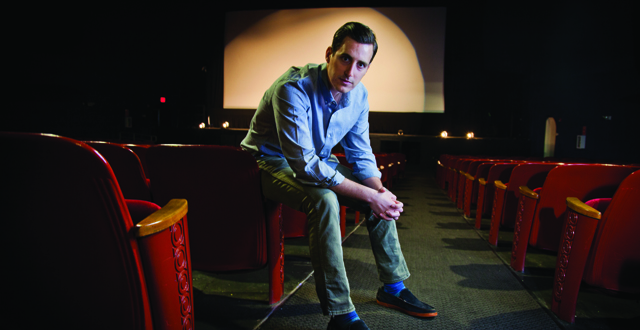Writer and filmmaker Eric Steele, who is part of the management team that runs the Texas Theatre, cut his teeth in the independent film world by producing works such as “Topeka,” “Uncertain, TX,” “Wuss,” and “Pit Stop,” which premiered at Sundance in 2013. We sat down with him to talk about his latest endeavor, “Bob Birdnow’s Remarkable Tale of Human Survival and the Transcendence of Self,” which he released and directed last year.
How would you describe the film?
It’s an experimental film centered on one man telling a story for 85 minutes. It’s experimental in that it’s more like old-fashioned storytelling. It’s just one guy standing up telling a story. He’s giving a motivational speech at a sales conference, and in the course of it he has a cathartic experience in a moment that becomes transcendent.
How did you come up with the idea?
It came from traveling for years for business. I was working for a consulting company, so I would go to a lot of seminars and conventions. A lot of these things are very boring and a lot of platitudes; there’s not a lot that’s authentic. So I had this idea: What if someone went up there and just spilled their guts, and it was just kind of this painful, messy authentic moment and all the people there were changed because of it?
How did it evolve over time?
I wrote it in 2008, so it’s been a several-year journey. I wrote it in one sitting on an airplane, and it all just flowed really rapidly. I wrote it as a one-man play that Barry Nash did. It started out as a reading at Kitchen Dog Theater. Then it was performed as one of the main shows for Second Thought Theater for the 2010 season. Then we went to Hollywood and did a week run of the show in the Hollywood Fringe Festival. Then a couple of friends, David Lowery and James Johnston, saw it and said, “You need to make this into a movie,” and we started making it into a film. So it’s had a really long life. Of all of them, the film works the best.
Did you have to change it much to make it a film?
No, the only thing I had to do was, I had to write another character in there, who’s basically the boss, Dave Jerry. He’s the guy who puts Bob on stage. He kind of sets the tone, and there are a lot of cutaways to Jerry. [Jerry and Birdnow] have a very specific kind of relationship. I had to add that to give some conflict to the film that kind of lacked from the theater piece. In the theater piece, the conflict is inherent because the audience is the conflict; you’re faced with this guy telling the story. In the movie, there’s that separation, so we had to kind of put the conflict in there. I think it works really well.
In the film, we still are able to create the feeling that the film audience is the audience, progressively. We did have a pool of extras, but they sort of disappear as the film progresses, and you sort of become the audience. It’s very intimate.
Bob Birdnow tells a personal survival story in the film; what was the influence behind that?
I’ve heard several survival stories that I think probably subconsciously influenced some of the horrific circumstances that he was faced with, but it wasn’t pulled from personal experiences. I’ve never had any near-death experiences or any immediate need to survive in the wilderness. Thank goodness. It was more that I related to the theme of the whole thing, which is: Who is your greatest self?
Bob Birdnow is an authentic person in a world where being authentic and honest isn’t always what’s important, especially in a corporate business market. That’s the sadness of it all. You go to these corporate meetings, and they’re so useless. What if actually that hour period was turned into something that left everyone in the room shaken or moved or inspired? What if people actually meant what they said, instead of being political or diplomatic or polite? We’d live in such a different world; I think a much better world.





